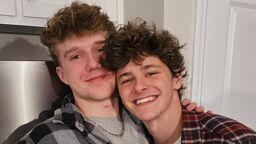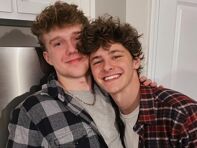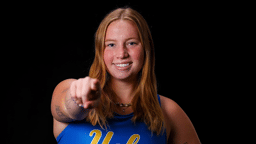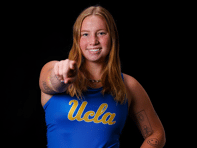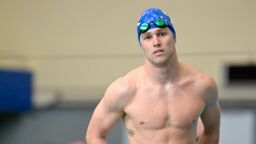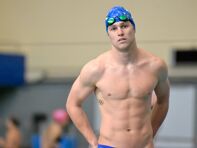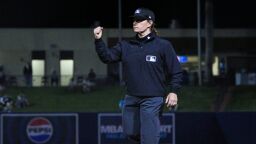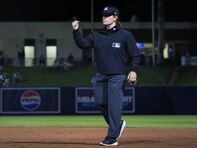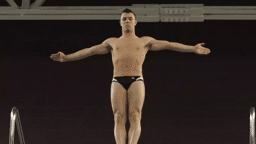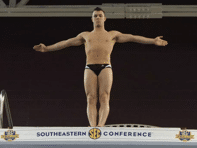I’ve spent majority of my athletic career overcoming both physical and metaphorical hurdles, and for the past five years I’ve been making a living by plunging myself off ice cliffs in glorified bathtubs with the wind racing down my back up to 95 mph and being crushed by 5 to 6 Gs.
Overcoming these hurdles propelled me onto a new and exciting path that led me to the Olympic Games in a way I could have never imagined.
During my long journey through sport — starting with track and field and now in bobsled — I learned to become authentically and unapologetically myself, learned to have pride in myself, learned to never compromise my character, to over-magnify one part of myself over the other, or to alter who I am in order to attain acceptance, including my sexual identity. This was something that took me almost 30 years to master, but it resulted in me competing in the 2018 Winter Olympics as an out athlete on my four-man bobsled team.
What’s beautiful about the human experience is we all have differences, whether they be our political standing, religion, sexual orientation, gender identity, race or culture, and some of us don’t fit perfectly into one tiny box. I know I certainly don’t.
I often joke about being a human panda, who is Black, white and Asian, because who doesn’t love pandas? I also like men and have struggled with my feelings for them and women over years, and getting to a place of self-confidence and self-acceptance has not been an easy road.
I’ve never liked being told who I am or how I should act, because I’ve never had the luxury of fitting neatly into a box. Being Black, white and Japanese, liking guys and girls, I’ve never really felt like I had an identity that was my own.
I was always told by others how I should act in accordance with how they saw me. My Black peers would tease me for speaking too “white.” I didn’t feel at home in the gay scene I would frequent with my friends. I’ve never quite fit neatly into a single category. I lacked confidence because I didn’t know or like certain aspects of myself, such as my sexuality.
I grew up in Stockbridge, Georgia, in the Bible Belt, where liking boys was taboo and where I was told it was my responsibility to carry on my family name. I had an interest in women from a young age and had many girlfriends over the years who I cared for and was attracted to. I also knew from an early age that I liked boys.
At 15, when the opportunity presented itself, I kissed my first boy.
At 15, when the opportunity presented itself, I kissed my first boy. The moment our lips touched, I felt an energy that I’d never experienced before. It was a mixture of the excitement you get when you feel you’re doing something rebellious with the chance of getting caught, combined with pure elation. This was something that felt right, that felt like me but in a different way than women made me feel.
Dating in high school and in college at Georgetown University was a series of experiences mostly filled with anxiety, fear and insecurity. I would be anxious dating women for fear I’d be shut down and seen as an undesirable pariah. I would constantly sneak around not only my teammates, but also my roommates, for fear of how I’d be seen.
I was already teased in high school for being different, for not being Black enough, or for being “soft,” so I threw myself into sport in order to prove myself. Because I was physically gifted I was able to feed into and excel in a toxic masculine culture through my athletic ability. Even though I was a talented runner, I felt the need to hide who I was to many of my teammates and friends. Running was my escape from the world around me. When I ran it was just me in the moment and the track.

In my early 20s I moved to Japan to run with the Japanese team. I am extremely proud of my Japanese heritage (my grandmother is Japanese and I am fluent in the language) and moving to Japan, the country I was drawn toward since childhood, felt like a coming home. I was able to see my cousins grow up and connect with the culture my grandmother introduced me to on a deeper level.
I quickly learned about the cultural concepts of “tattemae” and “hone,” the front you present to people and how you truly feel about them internally. I felt like a novelty being a foreigner in a Japanese company and the only foreign athlete in my training group. I was met with curiosity about America and questions about whether it’s the gun-slinging culture they saw in movies. But that soon changed about six months into my new life when what I can only describe as mental torture began to ensue and would last for almost two years. It took everything in me not to break.
I trained under an amazing coach and ran with the track team at his university coming in as one of the faster hurdlers in the group. I got along with all of the guys on the team and would cook with them, drink with them and have dinner parties at my apartment.
I loved the guys I was training with until one day I started receiving tons of messages from fake addresses telling me to go back to America and calling me the Japanese equivalent of the “N” word. I had grown numb and uncaring to this passive aggressive form of bullying when things started to escalate. I received 50 to 100 calls from blocked numbers a night for months.
The content of the messages made it evident the person was someone very close to me. They would refer to things I’d recall I’ve said in conversation before, but I couldn’t pinpoint with who. This person seemed to know whenever I had friends over, and even information about my close-knit American friends back home. It was almost as though I was under constant surveillance in my own home. I began to grow distrustful of everyone around me.
This bully was desperate to break me and get me to leave.
This bully was desperate to break me and get me to leave. The night before a big track meet someone slashed my car tires and spray-painted “F.U.C.K.” in big bold black letters on my car along with pejorative terms for my sexuality such as “homo ranna-“ and “kuso gei”, making me almost miss a championship meet. It was the kindness of an older neighbor I didn’t know who felt sorry for me and let me borrow his car to make it to my competition that saved the day. His kindness really moved me.
I showed up to the competition with about 25 minutes to spare. To give you reference, I usually warm up 90 minutes before running. Despite the obstacles I had to overcome to even race I won the competition and thanked the bully for the motivation publicly on my Facebook page, knowing he’d see it. This sent him into a rage.
I came back to my apartment one day to find it was broken into, my bed and sofa slashed with a knife, my apartment trashed, while some of my stuff smelled of urine. All the while the police did nothing. I had gone multiple times to the police before it escalated to this point, but they refused to act because I wasn’t Japanese.
The bully made fake profiles on gay dating sites and gave random men my number and address, would write messages about me in the bathroom next to the track and even emailed my mother telling her about the boys I was talking to. I couldn’t afford to hire a private investigator to help me figure out who was behind all of this, so I had to move to an undisclosed location.
In those two years, the bully succeeded in making me feel completely isolated. I fell back into a certain Christian religion I’d loosely associated with throughout my life and went back into a cycle of suppressing a very important part of myself, because those gave me a sense of belonging. With the lack of support and being unable to trust many of my friends in the area I felt as though I were utterly alone in the world.

In the country I had loved so much I now felt like an unwelcomed outcast. Then my tiny grandmother came to the rescue from the U.S. and marched into the police station on a mission. I had no hope they would do anything. But after she walked out the police actually started doing their job, and the threats began to stop. To this day I never did figure out who was behind those two years of utter hell.
By chance I competed in a USA Bobsled combine while still competing in track. I did well enough to get invited to rookie camp. I decided to take a leap of faith and resign from the company I’d been sponsored by, and my road to the Olympics took a slight detour from track and field.
In the fall of 2015 I was officially a bobsledder as we started the three-year stretch of making the 2018 Games in South Korea. These three years proved to be very strenuous and my character was tested during more than ever. The straightforward process of the fastest and strongest making the team wasn’t always the case.
Even after proving myself as a bobsledder, I was often told I was still a fragile track guy, and didn’t seem to fit in with the culture of the team. I just couldn’t be myself. I came into the sport trying to work things out with a former girlfriend and dated a few girls here and there, but I would still have to sneak around my teammates if I wanted to talk to guys.
I was scared how I’d be perceived by the very guys I’d have to squeeze into glorified bathtubs with in our Spandex because bobsled is a macho sport where chemistry is everything. I thought it’d politically hurt my chances of making an Olympic team if the guys knew I liked men.
The moment my four-man team and I qualified for the Games, all of those insecurities melted away. I no longer cared about people’s perception of me, because I just accomplished a feat few people get the honor of doing.
While at the Games, I was encouraged by a fellow LGBTQ Olympic teammate to come out in hopes that my story could help other athletes like me. Suspicion was building around the team about me to which I just casually addressed with a few of the guys.
I kissed a male friend for fun at the after party that all my teammates saw. They accepted me with open arms.
After competition was finished I had not a care in the world. I kissed a male friend for fun at the after party that all my teammates saw. They accepted me with open arms. Two of them gave me hugs and assured me I was still their teammate. They said they respected me for my athletic ability and willingness to be myself, and that my sexuality wasn’t what defined me.
Through that whole situation I learned that you cannot live your life dictated by the opinions of others. You have to live for you and find happiness being the wonderful person you are. You should never be ashamed in whom you love.
As a society I believe we need to embrace and celebrate the many differences we have while working together. That’s what I learned at the Olympic Games.

The Olympics are where the whole world comes together to celebrate each other’s differences while having pride in ourselves as individuals, and as a country, all through the medium of sport. It was the first time since childhood I felt my real and authentic voice again, and the first time I felt that sense of self-confidence outside of sport.
I am currently recovering from an injury and trying to get healthy to make my bid for Beijing 2022, but also to find a career I love post-Games. I’ve never wanted to be known as the “gay” or “Black” bobsledder, which is why I didn’t come out publicly at the Games, but I do think it’s important to be authentically myself going forward.
I no longer want to wear a mask and hope to be an inspiration for a young athlete hoping to achieve their Olympic dreams.
Chris Kinney, 31, is a member of the USA Bobsled team and competed in the 2018 Winter Olympics. In college, he ran track and field for Georgetown University, specializing in the hurdles. He can be reached via email ([email protected]), or Twitter or Instagram.
Story editor: Jim Buzinski
If you are an out LGBTQ person in sports and want to tell your story, email Jim ([email protected])
Check out our archive of coming out stories.
If you’re an LGBTQ person in sports looking to connect with others in the community, head over to GO! Space to meet and interact with other LGBTQ athletes, or to Equality Coaching Alliance to find other coaches, administrators and other non-athletes in sports.





